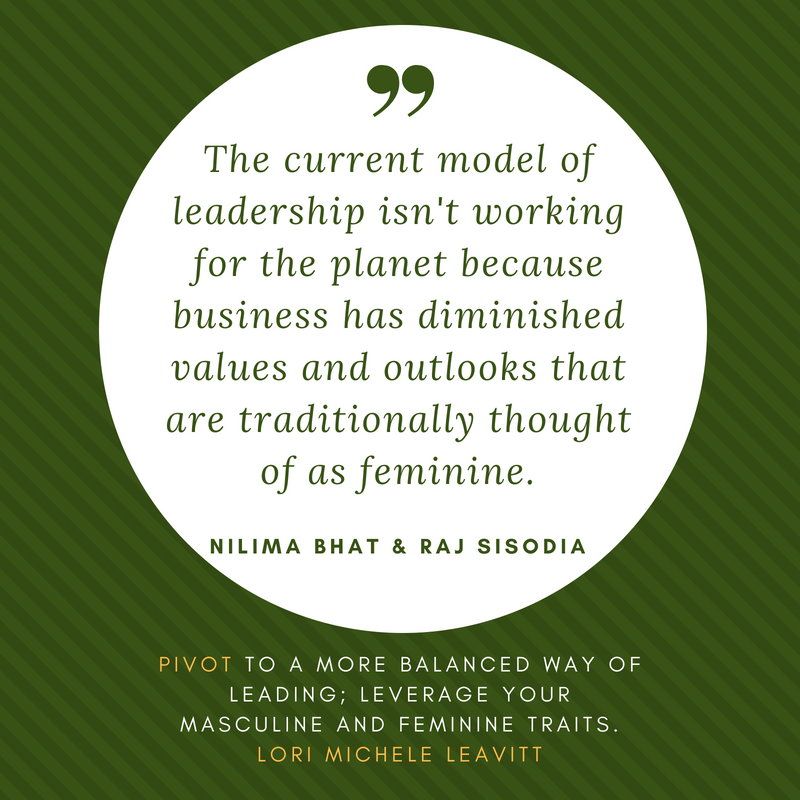
Input about how to BE as a “Leader” is plentiful. There are also books on management, which is part of the issue in our lack of leadership, which I’ll discuss briefly later.
Should you be more competitive and guided by The 48 Laws of Power or should you be more empathetic and guided by Emotional Intelligence? Answer? Be aware of both and be authentic to who you really are and why you are on this earth doing what you do. This is about balance.
First, envision how you want to BE, as a leader. Then, become aware of how you are BEING now (you’ll need to search inside and ask others whom you trust). And then, determine your best next steps to Pivot from the you right now to the you that you intend to be.
Here is one scenario to help you get clear about how a possible imbalance of your own masculine and feminine traits may be holding you back from being a great leader, or from meeting the expectations of a work role. I encourage you to collaborate with trusted others to understand how you are BEING so that you can then determine how you might change.
This example will be for a woman who has been in middle management and is now in consideration to be part of the senior leadership team:
(In my consulting and coaching practice I work with both male and female leaders individually or as part of a leadership team — I have experienced great leaders and find them to be able to balance their masculine and feminine traits and leverage different styles depending on the situation, and their gender doesn’t matter).
Back to the example of a woman and her desired shift from middle management to the senior leadership team. I’ll call her Anne. I promised I’d get back to how management skills do not directly translate to great leadership. If Anne has excelled at managing work, but hasn’t built up people, then this gives us an area for her to work on first. Is she interested in growing people? How is she at delegating responsibility while holding accountability? Has she succeeded as a manager because she’s very good at, and prefers, making sure work strictly adheres to how the work was done yesterday (and possibly decades ago)? How is she with change? How is she at empowering others to initiate change? How is she with helping others understand why a change is needed and bringing out the best in them?
Now let’s just pick one of these. Let’s say that the senior leadership team will greatly benefit from someone who can rally others to learn, grow and innovate. And yet she discovers that she’s actually not been great at building others up and she especially takes on too much of the work herself because she knows how it is supposed to be done. I’d recommend that her best next step would be to gain clarity around what she actually wants. If she doesn’t want to rally others then she’s not right for the new role. Perhaps she would be better suited for an achievement (vs advancement) track. If she does want to rally others and just never felt she was authorized to take the time and be the one to do this, then she might engage a coach to help her grow into BEING a more effected leader.
What does this have to do with masculine and feminine? Collaboration, for example, bringing people together to come up with better ways, is attributed as a feminine trait. We can’t presume that Anne is wired this way, but she might be; she may have been holding back because her role models and/or her current environment have caused her to bring out more masculine traits, to “be more decisive” or “commanding” about work, to get work done. Her lack of delegation, on the other hand, could come from a misunderstanding her feminine trait of helping; somehow mixing up that doing work that could be done by others (even if they first make mistakes) is not helping them. Task-orientation is a masculine trait.
None of these traits are good or bad, per se. To be a great leader you need to be aware of your style and how you come across to others in your organization and outside. Whether you are male or female, consider a bit of inner work to balance your masculine and feminine traits so you can lead (and grow) a variety of different people.